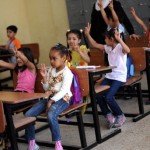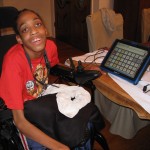Orlando Charter School Excels At Serving Students With And Without Disabilities

John O'Connor / StateImpact Florida
UCP's Bailes campus in East Orlando serves students as young as six weeks up through 3rd grade. About half of the school's students have a disability.
When her three-year-old granddaughter moved to Orlando, the dean of education at the University of Central Florida knew exactly where she should go — a school founded for children with disabilities.
Young Ellie doesn’t have a disability. But Sandra Robinson says she’s still best served in the toddler program at the UCP Bailes campus in East Orlando.
“She would have the opportunities to work with these very skilled teachers,” Robinson said, “but also in such a diverse classroom so that from her very early years Ellie would understand differences in people.”
It’s one of seven charter schools run by the non-profit UCP, affiliated with the central Florida chapter of United Cerebral Palsy. And it’s unique in several ways.
Half of its students are like Ellie and don’t have a disability. The other half has disabilities such as cerebral palsy, Down syndrome, and autism.
New research suggests this mix of students raises achievement — not only for the students with disabilities, but their non-disabled classmates as well.

UCF Education School Dean Sandra Robinson recommended the UCP charter school for her non-disabled granddaughter.
And UCP is one reason Orange County charter schools educate more kids with disabilities than any other school district – six times the rate of other large districts.
It’s the exception in a state where 86 percent of charter schools don’t serve a single child with a severe disability, according to a StateImpact Florida/Miami Herald investigation.
Many charter schools say they can’t afford to take on students with severe disabilities. But those students are part of the business plan at the UCP charter schools.
While rare among Florida charters, experts say UCP’s model –known as inclusion — will grow more common.
“That kind of population is what we think our students will see in the future,” Robinson said.
“What a wonderful laboratory for us”
UCP got started in Orlando in the 1950s, said school CEO Ilene Wilkins, but the group’s board decided to expand its educational mission by chartering a school in 2001.
UCP’s first schools focused on early childhood services for students with disabilities. The schools refocused their methods a few years later and adopted an inclusion model that puts students with disabilities and students without disabilities in the same classroom.
The Bailes campus has 280 students, ranging in age from 6 weeks through third grade. The school plans to add a fourth grade class next year and a fifth grade class the following year.
Other UCP campuses serve high school and college students.
The first batch of UCP 3rd graders will take the Florida Comprehensive Assessment Test this year. Wilkins said the school has fared well on other standardized testing and earned the highest rating among voluntary pre-Kindergarten programs.
Wilkins said students and parents like class sizes of 16 to 18 students and the focus on arts and technology. Teachers must submit a video with their job applications to demonstrate their high-tech creativity.
The school also has a savvy business plan built on a menu of services most charter schools can’t offer. Those additional services help create a pipeline of students for the charter school.
The school also has a ready pool of potential students by offering infant day care services, afterschool and summer programs and physical, occupational and speech therapy services. The programs give students and parents a chance to see UCP in action, and many decide to enroll.
“That really is how we grow our inclusion,” said Ilene Wilkins the school’s CEO. “Infant care is very challenging. We get a lot of students that come in as infants and then they kind of grow.
“One of the problems other charters have is the charter is the charter,” she said. “It opens at 7 (a.m.) and closes at 6 (p.m.) and that’s all…We really look at how we can blend a lot of funding sources.”
Surprising Gains
While UCP has found ways to create a pipeline for new student, some parents may soon seek out schools like these.
Why? A growing body of research shows that both students with disabilities and their non-disabled peers perform better when they share the same classroom, said University of Syracuse education professor Julie Causton-Theoharis.

John O'Connor / StateImpact Florida
The UCP Bailes campus has a playground designed to be accessible for students with disabilities.
“I think for a long time people thought inclusion was a good idea because it’s a social justice issue,” Causton-Theoharis said. “But right now we’re pretty excited by the academic achievement gains of students with disabilities in inclusive settings.
“The other piece that’s a little surprising is the academic gains by students without disabilities.”
Most often the reason for the gains is that inclusion classrooms have two teachers, she said. One instructor focuses on general education while the other on special education.
Those teachers can collaborate and challenge each other to draft more creative lesson plans, Causton-Theoharis said. The collaborative lesson plans usually work better for all students, she said.
The UCP schools also use two teachers in each classroom. School officials provided an example of how the system works.
Students without disabilities might have lessons on how to multiply double-digit figures together. If those skills are beyond some students in the class, the special education teacher might teach the same lesson to those students using blocks or other items to explain the concept.
Shannon Dimino is a speech therapist at UCP. She’s also the parent of two children who have enrolled in the pre-Kindergarten program.
“I love the opportunity to coordinate with parents,” Dimino said. “I just love the team approach.”
Finding a Partner

John O'Connor / StateImpact Florida
A sampling of the high-profile companies which have contributed to UCP's schools.
The extra resources come at a cost. Students with disabilities are more expensive to educate.
In Miami-Dade County, for instance, state funding only covers about 60 percent of the cost of educating children with disabilities.
Wilkins admits that running UCP’s network of schools is a more difficult challenge than most schools face.
The charter network has a $7.5 million budget. Public funding covers most of that total, Wilkins said, and private fundraising contributes about 10 percent.
Donors provided $6 million of the flagship campus’ $9 million total cost. Big corporate names such as IBM, Cisco, Bacardi and Lincoln Financial adorn plaques in the school’s lobby.
UCP has made supporting the schools its priority, Wilkins said. She has been meeting with UCP chapters in other parts of the state, including Miami, about how to replicate what the Orlando schools are doing.
“Start small, start slow,” Wilkins said of her advice to others looking to open a charter school specializing in disabilities.
“I think it’s important to find a good partner,” she says – a partner like UCP.


